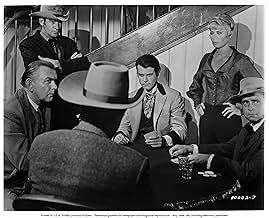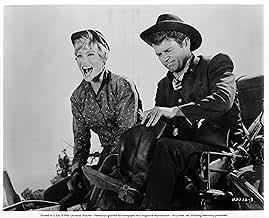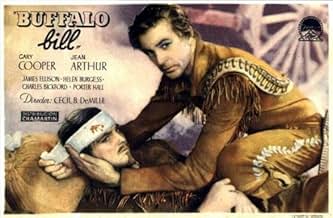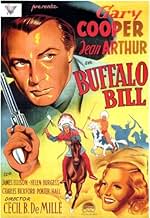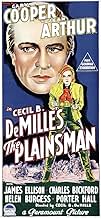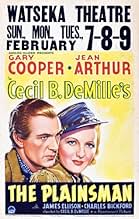NOTE IMDb
6,8/10
2,5 k
MA NOTE
Ajouter une intrigue dans votre langueWild Bill Hickok and Buffalo Bill Cody attempt to stop an Indian uprising that was started by white gun-runners.Wild Bill Hickok and Buffalo Bill Cody attempt to stop an Indian uprising that was started by white gun-runners.Wild Bill Hickok and Buffalo Bill Cody attempt to stop an Indian uprising that was started by white gun-runners.
Fred Kohler
- Jake - A Teamster
- (as Fred Kohler Sr.)
Pat Moriarity
- Sgt. McGinnis
- (as Pat Moriarty)
Histoire
Le saviez-vous
- AnecdotesJohn Wayne very much wanted the role of Wild Bill Hickok, which he felt certain would make him a star, but director Cecil B. DeMille wanted Gary Cooper instead.
- GaffesOn the evening of Lincoln's assassination Van Ellyn and his associates are discussing the supposedly then current John Soule editorial, "Go West, Young Man." Lincoln was murdered in 1865. Soule wrote that famous line in 1851.
- Citations
Calamity Jane: Tip your hat when you speak to a lady!
Wild Bill Hickok: I will... when I speak to a lady.
- Versions alternativesThe UK DVD is cut by 2 secs to remove a horsefall.
- ConnexionsFeatured in The Hollywood Collection: Anthony Quinn an Original (1990)
- Bandes originalesWhen Johnny Comes Marching Home
(1863) (uncredited)
Written by Louis Lambert
Played as background music for the first scene, Washington, D.C.
Commentaire à la une
This Cecil B. DeMille epic of the old West contains what may be Jean Arthur's finest performance, as a hysterical, eccentric, incurably amoral, but devotedly doting Calamity Jane. She really pulled it off! Gary Cooper is at his most taciturn, but manages some occasional pithy sayings: 'The plains are big, but trails cross ... sometimes.' The story is a pastiche to end all pastiches. All the cowboy heroes of Western lore seem to be in there somehow except for Jesse James. Even Abraham Lincoln opens the story in person (or at least, DeMille would have us believe so). There is no room for anything so evanescent as subtlety, this is a 'stomp 'em in the face' tale for the masses. A remarkable thing about this film however is that it is a very early full frontal attack on what Eisenhower was eventually to name 'the military industrial complex'. It isn't just a story about gun-runners, but about arming anyone for money, and doing so from the heart of Washington. But let's not get into politics, let's leave that to DeMille, who can be guaranteed to be superficial. The chief interest of this film all these years later is that it uses the first film score composed by George Antheil, who has a lot to say about the job in his autobiography, 'Bad Boy of Music'. Antheil seems to have originated 'the big sound' adopted by all subsequent Westerns, whereby the plains sing out with the voices and sounds of countless cowboys in the sky, celebrating the open spaces and interweaving common melodies. That is why it does not sound at all unusual, because we have heard it a thousand times. But he seems to have been the first to summon up the combined rustlings of all the sage brush into this symphony of the open skies which has entered into American mythic lore, and given it a soundtrack which has never varied since then, corny as it may be, but doubtless appropriate. It is amusing to see Anthony Quinn in an early appearance as a Cheyenne Indian. Gabby Hayes is in there somewhere, but you miss him in the crowd. Gary Cooper overtops them all, looming large, - but when did he ever loom small?
- robert-temple-1
- 27 nov. 2007
- Permalien
Meilleurs choix
Connectez-vous pour évaluer et suivre la liste de favoris afin de recevoir des recommandations personnalisées
- How long is The Plainsman?Alimenté par Alexa
Détails
Box-office
- Budget
- 1 000 000 $US (estimé)
- Durée1 heure 53 minutes
- Couleur
- Rapport de forme
- 1.37 : 1
Contribuer à cette page
Suggérer une modification ou ajouter du contenu manquant

Lacune principale
What is the French language plot outline for Une aventure de Buffalo Bill (1936)?
Répondre

